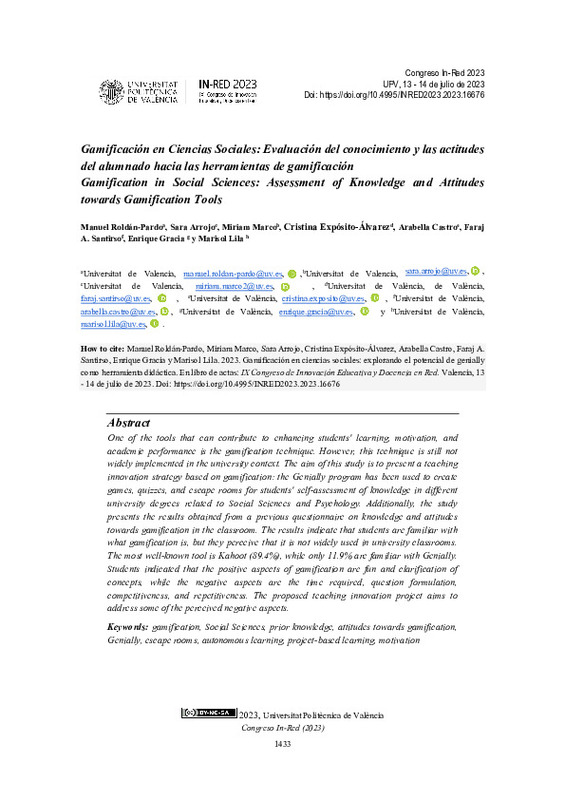JavaScript is disabled for your browser. Some features of this site may not work without it.
Buscar en RiuNet
Listar
Mi cuenta
Estadísticas
Ayuda RiuNet
Admin. UPV
Gamificación en Ciencias Sociales: Evaluación del conocimiento y las actitudes del alumnado hacia las herramientas de gamificación
Mostrar el registro sencillo del ítem
Ficheros en el ítem
| dc.contributor.author | Roldán-Pardo, Manuel
|
es_ES |
| dc.contributor.author | Arrojo, Sara
|
es_ES |
| dc.contributor.author | Marco, Miriam
|
es_ES |
| dc.contributor.author | Expósito-Álvarez, Cristina
|
es_ES |
| dc.contributor.author | Castro, Arabella
|
es_ES |
| dc.contributor.author | Santirso, Faraj
|
es_ES |
| dc.contributor.author | Gracia, Enrique
|
es_ES |
| dc.contributor.author | Lila, Marisol
|
es_ES |
| dc.date.accessioned | 2023-12-07T13:15:07Z | |
| dc.date.available | 2023-12-07T13:15:07Z | |
| dc.date.issued | 2023-10-06 | |
| dc.identifier.isbn | 9788413960883 | |
| dc.identifier.uri | http://hdl.handle.net/10251/200560 | |
| dc.description.abstract | [EN] One of the tools that can contribute to enhancing students' learning, motivation, and academic performance is the gamification technique. However, this technique is still not widely implemented in the university context. The aim of this study is to present a teaching innovation strategy based on gamification: the Genially program has been used to create games, quizzes, and escape rooms for students' self-assessment of knowledge in different university degrees related to Social Sciences and Psychology. Additionally, the study presents the results obtained from a previous questionnaire on knowledge and attitudes towards gamification in the classroom. The results indicate that students are familiar with what gamification is, but they perceive that it is not widely used in university classrooms. The most well-known tool is Kahoot (89.4%), while only 11.9% are familiar with Genially. Students indicated that the positive aspects of gamification are fun and clarification of concepts, while the negative aspects are the time required, question formulation, competitiveness, and repetitiveness. The proposed teaching innovation project aims to address some of the perceived negative aspects. | es_ES |
| dc.description.abstract | [ES] Una de las herramientas que puede contribuir a potenciar el aprendizaje, motivación y rendimiento académico del estudiantado es la técnica de la gamificación. Esta técnica, sin embargo, aún está poco implantada en el ámbito universitario. El objetivo de este trabajo es presentar una estrategia de innovación docente basada en la gamificación: se ha utilizado el programa Genially para crear juegos, cuestionarios y escape rooms para la autoevaluación de conocimientos del alumnado en diferentes carreras universitarias relacionadas con las Ciencias Sociales y la Psicología. Además, se presentan los resultados obtenidos en un cuestionario previo de conocimiento y actitudes hacia la gamificación en el aula. Los resultados indican que el alumnado conoce qué es la gamificación, pero perciben que no lo han utilizado mucho en las aulas universitarias. La herramienta que más conocen es Kahoot (89,4%), en cambio sólo el 11,9% conoce Genially. El alumnado indicó como aspectos positivos de la gamificación la diversión y la aclaración de los conceptos, y como aspectos negativos el tiempo empleado, la formulación de las preguntas, la competitividad y que es repetitivo. El proyecto de innovación docente que se plantea pretende incidir en los aspectos negativos y mejorar algunas de los aspectos negativos percibidos. | es_ES |
| dc.format.extent | 10 | es_ES |
| dc.language | Español | es_ES |
| dc.publisher | Editorial Universitat Politècnica de València | es_ES |
| dc.relation.ispartof | In-Red 2023 - IX Congreso Nacional de Innovación Educativa y Docencia en Red | |
| dc.rights | Reconocimiento - No comercial - Compartir igual (by-nc-sa) | es_ES |
| dc.subject | Gamificación | es_ES |
| dc.subject | Ciencias Sociales | es_ES |
| dc.subject | Conocimientos previos | es_ES |
| dc.subject | Actitudes hacia la gamificación | es_ES |
| dc.subject | Genially | es_ES |
| dc.subject | Escape rooms | es_ES |
| dc.subject | Aprendizaje autónomo | es_ES |
| dc.subject | Aprendizaje basado en proyectos | es_ES |
| dc.subject | Motivación | es_ES |
| dc.subject | Gamification | es_ES |
| dc.subject | Social Sciences | es_ES |
| dc.subject | Prior knowledge | es_ES |
| dc.subject | Attitudes towards gamification | es_ES |
| dc.subject | Autonomous learning | es_ES |
| dc.subject | Project-based learning | es_ES |
| dc.subject | Motivation | es_ES |
| dc.title | Gamificación en Ciencias Sociales: Evaluación del conocimiento y las actitudes del alumnado hacia las herramientas de gamificación | es_ES |
| dc.title.alternative | Gamification in Social Sciences: Assessment of Knowledge and Attitudes towards Gamification Tools | es_ES |
| dc.type | Capítulo de libro | es_ES |
| dc.type | Comunicación en congreso | es_ES |
| dc.identifier.doi | 10.4995/INRED2023.2023.16676 | |
| dc.rights.accessRights | Abierto | es_ES |
| dc.description.bibliographicCitation | Roldán-Pardo, M.; Arrojo, S.; Marco, M.; Expósito-Álvarez, C.; Castro, A.; Santirso, F.; Gracia, E.... (2023). Gamificación en Ciencias Sociales: Evaluación del conocimiento y las actitudes del alumnado hacia las herramientas de gamificación. Editorial Universitat Politècnica de València. 1433-1442. https://doi.org/10.4995/INRED2023.2023.16676 | es_ES |
| dc.description.accrualMethod | OCS | es_ES |
| dc.relation.conferencename | IN-RED 2023: IX Congreso de Innovación Educativa y Docencia en Red | es_ES |
| dc.relation.conferencedate | Julio 13-14, 2023 | es_ES |
| dc.relation.conferenceplace | Valencia, España | es_ES |
| dc.relation.publisherversion | http://ocs.editorial.upv.es/index.php/INRED/INRED2023/paper/view/16676 | es_ES |
| dc.description.upvformatpinicio | 1433 | es_ES |
| dc.description.upvformatpfin | 1442 | es_ES |
| dc.type.version | info:eu-repo/semantics/publishedVersion | es_ES |
| dc.relation.pasarela | OCS\16676 | es_ES |








